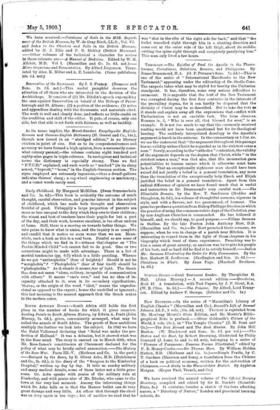Early Childhood. By Margaret McMillan. (Swan Sonnensehein and Co. 3s.
6d.)—This book is evidently the outcome of much thought, careful observation, and genuine interest in the subject of childhood, which has made both thought and observation fruitful of good. Unhappily a large proportion of parents are more or less unequal to the duty which they owe to their children ; the wisest and best of teachers have their pupils for but a part of the day, and their work, however excellent, is too often undone at home. Still, there is a moving on towards better things. We take pains to know what is amiss, and the inquiry is so complete and candid that it makes us seem worse than we are. Mean- while, such a book as this is a real boon. Painful as are some of the things which we find in it—witness the chapter on "The Feeble-Minded Child "—it cannot fail to do good. One or two corrections might be made with advantage. There is a list of morbid tendencies (pp. 64) which is a little puzzling. Whence do we get "anthrophobia" (fear of heights) ? Should it not be " acrophobia" ? "Photophobia " (fear of fear itself) should be "phobophobia." As it stands it means fear of light. The Greek ISiog does not mean "alone, solitary, incapable of communication with others." It means "one's own," and has no idea of in- capacity attached to it, even in its secondary sig,nifications. 'ISlifrrns, or the origin of the word "idiot," means the unprofes- sional as opposed to the expert ; hence the unskilled or ignorant ; this last meaning is the nearest approach that the Greek makes to the modern sense.






































 Previous page
Previous page